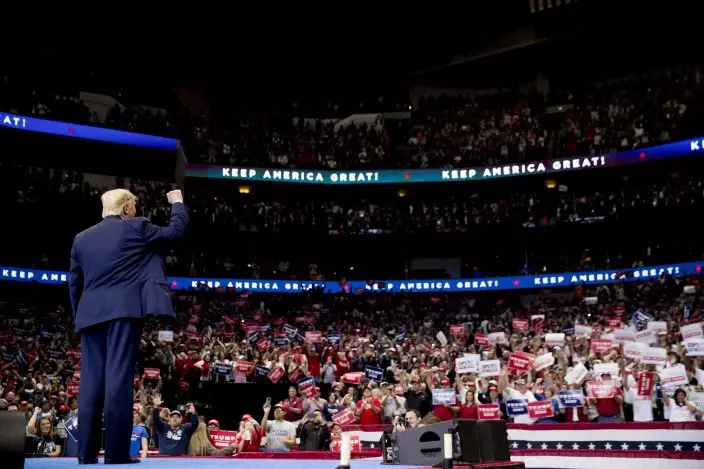It's never just a deal.
President Donald Trump's penchant for overselling his accomplishments has been on vivid display in recent days as he hailed his Syria cease-fire as a boon for civilization and claimed his trade agreement with China was the biggest ever. The economy is the "greatest" ''in the history of our Country," the military is the "most powerful" it has ever been, regulations have been cut at record rates, and, in his telling, America is "winning, winning, winning" like never before.
Trump has been a master of the art of exaggeration for decades, as he famously explained in his 1987 book, "The Art of the Deal."

President Donald Trump takes the stage at a campaign rally at American Airlines Arena in Dallas, Texas, Thursday, Oct. 17, 2019. (AP PhotoAndrew Harnik)
"People want to believe that something is the biggest and the greatest and the most spectacular," he wrote. "I call it truthful hyperbole. It's an innocent form of exaggeration, and a very effective form of promotion."
A search of Trump's Twitter feed turns up more than 1,200 mentions of the words "biggest," ''best" and "smartest."
Critics, for their part, accuse him of creating problems in order to solve them — essentially setting fires and then demanding credit for putting them out.
Here's a look at some recent inflated claims.
THS SYRIA CEASE-FIRE
Trump made big news Thursday when he announced that Vice President Mike Pence and other top administration officials had secured a five-day cease-fire deal with Turkey in northeast Syria — something Turkish President Recep Tayyip Erdogan had said he wouldn't do.
Trump quickly took credit, insisting his "unconventional approach" — including a pullback of U.S. troops that paved the way for a Turkish invasion targeting Syrian Kurds — was responsible.
Rather than bemoaning the loss of life that resulted, Trump spent much of Thursday minimizing the carnage and hailing the deal in epic proportions.
"It's really a great day for civilization," Trump said. He insisted that because of his intervention, "millions of lives will be saved."
"What Turkey is getting now is they're not going to have to kill millions of people, and millions of people aren't going to have to kill them," Trump said. In all, over the more than eight years of Syria's devastating civil war, hundreds of thousands have been killed.
THE CHINA DEAL
Trump last week announced with great fanfare a reprieve in the U.S.-China trade war that has resulted in tariffs on hundreds of billions of dollars of goods.
"The deal I just made with China is, by far, the greatest and biggest deal ever made for our Great Patriot Farmers in the history of our Country," Trump tweeted the day after. "In fact, there is a question as to whether or not this much product can be produced? Our farmers will figure it out. Thank you China!"
But despite his big talk, there is much left to be done, with many details to be determined and no documents signed. And some of the thorniest issues — such as U.S. allegations that China forces foreign companies to hand over trade secrets and a major dispute over the Chinese telecommunications giant Huawei — were dealt with only partially, or not at all, and will require further talks.
"The president is acting as if a lot of Chinese concessions have been nailed down, and they just haven't," said Derek Scissors, a China specialist at the conservative American Enterprise Institute.
CRITICIZING DEMOCRATS
Plenty of politicians criticize their rivals for having a bad idea or pushing ill-conceived policies. Trump paints them as an existential threat to the Republic and democracy. Throughout the 2016 campaign, the 2018 midterms and at his recent rallies, Trump has demonized Democrats as the enemy, claiming Thursday that they are out to "destroy America as we know it."
"At stake in this fight is the survival of American democracy itself," he told the crowd at a Dallas campaign rally. "I don't believe anymore that they love our country."
He warns the stock market will crash if he loses, and says Democrats want to destroy health care and repeal the Second Amendment.
HIS CROWD SIZE
Trump's exaggerations of his crowd sizes are well documented. On Thursday night he offered a doozy.
"So outside, they have close to 30,000 people," he reported to the enthusiastic crowd. Then he asked local officials whether they might be able to "fill up this little area, let 'em in. It would be so nice."
"You know they have a certain max," he added. "We broke the record tonight."
Tamika Dameron, a public information officer with the Dallas Police Department, said that wasn't even close.
The Dallas Fire-Rescue Department and American Airlines Center calculated the total number inside was 18,500, less than the 20,000 or so capacity of the arena, and said there were "about 5,000 on the outside."
During the Mavericks 2011 NBA Finals series, the highest attendance at the American Airlines Center was 20,433.
Associated Press writers Jake Bleiberg and Stephen Hawkins in Dallas contributed to this report.










